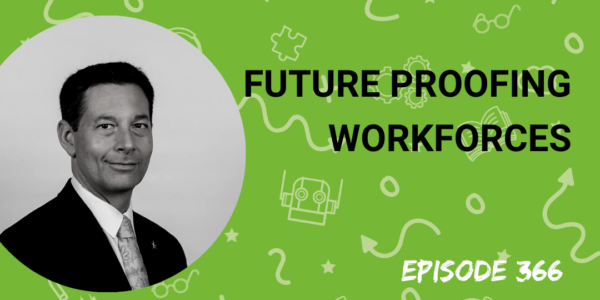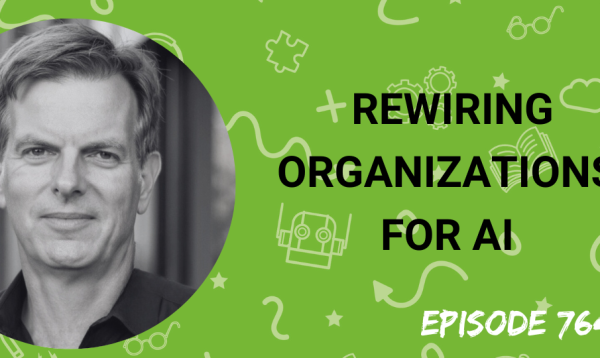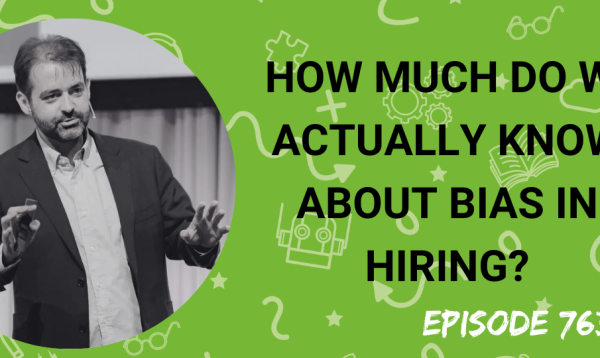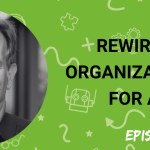With external talent shortages set to become the long term trend, many employers have to evolve their talent strategies to ensure they have the skills to be competitive.
Reskilling, focused redeployment, and talent marketplaces are vital parts of this, so what is it that employers should be doing to make sure they are set up for the future?
My guest this week is John Morgan, President of Lee Hecht Harrison, global specialists in workforce transformation. John has some great insights and valuable advice to share for all employers as we navigate these continually disruptive times.
In the interview, we discuss:
• How the pandemic has affected talent markets and how employers are evolving their strategies
• The right skills for digital transformation
• Career pathing in the digital economy
• Holistic approaches to talent management
• Focused redeployment and open talent marketplaces
• Doing talent mobility well.
• How will things evolve over the next two years?
Listen to this podcast in Apple Podcasts
Transcription:
Matt Alder [00:00:00]:
Support for this podcast is provided by Willow, the One Way video interviewing platform. Speaking to candidates on Zoom Teams or Skype is a great way to meet people, but it can also be exhausting, inefficient and inconvenient. Willow has taken the interviewing process and brought it into the 21st century. They looked at all the negatives of traditional interviewing, like scheduling, fatigue, anxiety and travel, and created a virtual interviewing process that candidates actually love. And they have the NPS score to prove it. With Willow, you simply write a series of questions that you want candidates to answer, then share the link with them. They then answer your questions in their own time on any kind of device or browser. The company has a real focus on making the process easy and making it feel as candidate friendly as possible. They also have native integrations with Workable Greenhouse and Zapier so you can automate your selection process, cast a wider net and and really scale things up. Willow offers a totally free version that allows you to trial their approach to video interviewing for as long as you need to, and then when you do want to upgrade, it’s genuinely affordable and they’ll even plant a tree for you to ensure that every interview is carbon neutral. Sign up for free at Willow Video. That’s W I L L O dot Video.
Matt Alder [00:01:42]:
Hi everyone, this is Matt Alder. Welcome to episode 366 of the Recruiting Future podcast. With external talent shortages set to become the long term trend, many employers have to evolve their talent strateg strategies to ensure they have the skills to be competitive. Reskilling, focused redeployment and talent marketplaces are vital parts of this. So what is it that employers should be doing to make sure they’re set up for the future? My guest this week is John Morgan, President of Lee Hecht Harrison Global Specialists in workforce Transformation. John has some great insights and valuable advice to share for all employers as we navigate these continually disruptive times. Hi John, and welcome to the podcast.
John Morgan [00:02:32]:
Hey Matt, great to be here.
Matt Alder [00:02:33]:
An absolute pleasure to have you on the show. Could you just introduce yourself and tell us what you do?
John Morgan [00:02:38]:
Absolutely. So, John Morgan, I’m the president of Leehack Harrison. We are the world’s largest and leading career transition and outplacement and talent development firm. And so really what that means is we get the pleasure of working with large and medium sized companies to really help their employees navigate lots of different career transitions. From entering into organizations, from moving around and being promoted inside of organizations, and then in certain situations, exiting organizations. So we really help people navigate all those different career moments.
Matt Alder [00:03:10]:
And I think that gives you probably a unique view of what’s happening globally in the. In the talent market at the moment. We’re obviously coming out of a very disruptive 18 months that’s turned everything on its head. I mean, how is the pandemic affecting talent markets? How is it affecting people’s strategy? How are employers evolving their approaches?
John Morgan [00:03:30]:
Sure. Great question, Matt. Look, I think probably the headline right now, especially in the US More so than other places, is there’s just a massive labor shortage that’s being driven in part by some of the economic stimulus that’s happening. But if you just look at some of the data, I think there’s real inability to hire qualified workers that’s needed. The US Economy is basically at full employment, and companies are really struggling to fill open requisitions that they have. Right. There’s something over 8 million vacant job openings, I think, in the United States, which is a record high. It’s up over a million from February. So I think right now the headline really is that there’s a labor shortage. And so what companies are doing. And they’ve been doing this, right. We’ve been talking about future proofing the workforce for a couple of years now. And that’s been on the agenda of many chros that I talk to, but that’s really started to accelerate a little bit. And what I mean by future proofing, you know, the workforce is really saying, you know, companies really can’t rely on filling these roles in the external market solely. Right. They really have to have a solid internal mobility. They really have to have a solid redeployment program that’s focused on helping the people that they have today, you know, develop the skills that they need to fill some of these open recs that they’re struggling in the open talent marketplace to fill. So that’s. That’s going on. And probably the biggest theme that I’m hearing about right now, I want to.
Matt Alder [00:05:00]:
Dig into that a bit deeper. And there are so many things that we could, that we could talk about. But just before we do, I just wanted to talk a little bit about digital transformation. Obviously, digital transformation has been something that’s been affecting, something that has been driving change in businesses for some time now. But obviously a lot of that has been amplified in the last sort of 18 months to two years. What do employers need to do to make sure they’ve got the right skills in their business, particularly as we sort of come out of the pandemic or move into the next phase of the pandemic. And companies are sort of even more digital in their approach.
John Morgan [00:05:38]:
No, for sure. I mean, I think, look, I think technology and digital transformation, I think, is one of the factors that’s affecting job growth, right? I mean, there’s clearly a, a skills gap that’s out there that we need to, that we need to work on to, to suit employees for the digital future of the world that we’re going to work in. Right. I mean, there’s, you know, global spending on AI is going to double over the next four years. There’s no doubt about it. I mean, we’ve seen research from the World Economic Forum that’s predicted, right, as many as 85 million people could be displaced from current jobs by advances in AI. So, you know, it’s, it’s, it’s real, right? It’s very real. And so the most pragmatic thing that companies can really do to address this skills issue that’s happening in the digital transformation is to help their employees understand what are those skills that are in demand for tomorrow. And so what we’ve seen is a lot of great technology packages out there that scrape all the job postings, that look at skills ontologies and really break down different types of jobs, that say, what are the jobs that are most likely to be automated in the next five years? And there’s tons of data sets out there that employers can get their hands on and make available to their employees so that they can see that and really make a personal understanding of where people might be at risk. And then also employers can give people, again, the power and data here, right? Is give people insights into which skills are most in demand in the future, and then obviously supply whether it’s stipends, whether it’s focused training and reskilling, but give them the means to actually fill those gaps. Right? And some of the most pragmatic things that we’ve seen is real focused career development programs that get down to the level of role that somebody’s in. So if I’m, say, in a marketing manager role, what are the digital skills that now I need to acquire, whether that’s something like Tableau or SQL or any other data software package that I might need to develop skills in to not only advance my career as a marketing manager, but also to make sure that I’m not obsolete in the future. Right? And what we also see, right, is that if you’re going to be able to acquire those new skills, you’re obviously going to have a wage increase as well. So the way I would summarize it, right, is employers really need to give their employees insights. They need to make sure that they have really tight redeployment programs and that they’re giving people career paths to help develop the skills that they need in the digital economy.
Matt Alder [00:08:11]:
Leading on from that, one of the things that people talking a lot about is having a much more sort of holistic approach to talent rather than just seeing it in silos of talent acquisition and talent management and contingent workforce and all those kind of things. What are you seeing out there and how should employers be sort of changing their thinking around talent and skills?
John Morgan [00:08:34]:
Again, I think the context, right, is that it’s very difficult to have an over reliance on sourcing folks from outside sources right now because there is such a labor shortage. So I think it forces you even more to be holistic. Right. And so again, I think the companies that are getting it right are saying, listen, in the past when we’ve had to do, you know, restructuring or, or, or cut costs, we’ve had to, you know, we’ve had to exit certain amounts of our, of our workforce. And, and we, we at LHH have always been involved with that, given the business that we’re in and out placement, right. What companies now are really doing is they’re saying, okay, I’m going to intentionally carve out a segment of that, you know, population that might look redundant now on an Excel spreadsheet. Right? But actually, you know, might be able to have adjacent skills to be developed to fill these roles internally. Right? And, and when you get this to the CFO’s agenda, it’s pretty clear, right? You can save well over 100k per hire if you redeploy a person versus exiting a person and then having to try to hire them, especially trying to hire them in a market where talent is scarce. So the companies that are getting this right are having really focused redeployment programs that again, gives people clarity and points them to the open roles very intentionally that exist in the organization today. Also equipping managers to have really focused career discussions so that, you know, we’re not talent hoarding anymore, but we’re actually changing the culture inside companies that say talent mobility is a necessity. You got to break down the silos to your point. Yeah, you have to take a much more holistic approach. And people who have transferable skills, you know, need to have in their development plan the three to Five jobs inside the company that they could be a fit for in the next several years. And, and some of the work that we’re doing around career mobility and with these leading edge companies, I mean, it’s really making a big difference, right? They’re, they’re saving a ton of money on exit costs, but they’re absolutely breaking down silos, as you say. And they’re having what we call an open talent marketplace inside of their company. Right. Free movement of talent. But it’s intentional, right? It’s pointing people with the right skills towards open recs that recruiters are trying to fill.
Matt Alder [00:10:47]:
So it’s a big topic. Lots of people are talking about mobility, but also lots of companies seem to, seem to really struggle with it. Obviously you’re dealing with some organizations who are doing it really, really well. What are the main challenges and what are those organizations who are doing it well? What are they, what are they doing to overcome them?
John Morgan [00:11:06]:
It’s a combination, right, of, of making the process a bit more self service, right? So, so there’s lots of technologies out there in the career mobility world that, that make it easier for, for an employee to understand what their current skills are, see what the gaps are and see what the, you know, what the jobs of tomorrow inside the company actually look like. Because, you know, you have to take it from concept, which is, you know, it’s very, it can be a very conceptual discussion that everybody understands. Of course we want talent mobility, of course we want to move people around. But, but then what does the service level actually look like to facilitate that? And so the companies that are getting it right are again providing real insights into, you know, the hiring forecasts that they have, the specific, you know, jobs that they think are going to be growing and the skills that are needed. And they actually have the skills ontologies, you know, develop so that it’s very clear that as an employee I need to pick up these three to five skills over the next year if I’m going to be fit for purpose and fit for future in this company. And you know, what we do as part of our service is we actually have a digital tool where employees can do very simple things like upload their cv and the technology parses it out and maps them right to different career openings inside of the company because it’s linked to the applicant tracking system so that in real time, when somebody’s going through an internal mobility program from a couple of clicks, you make it easy for the person from a user experience, they can really start to see, okay, here are my Skills and interests. Here’s how that maps to the opportunities that exist in my company today. And the best company, I mean the real leading edge companies are then augmenting that technology by giving people one on one career coaching. And I think that’s what’s really the really special bit about internal mobility. You can use all these digital tools, but at the end of the day we can never forget that we’re all in a very personal business, we’re on a very human business. So, you know, we say, you know, use the technology to give people insights about where they can go, jobs, skills, etc. But then, you know, the human career coaching element to help someone navigate that and providing that in a, in a consumable way for companies, right, that they can deploy internal career coaches and enable those discussions to happen. That’s where you really see great retention stories.
Matt Alder [00:13:32]:
So as a final question, obviously it’s very, very difficult to predict what the future is going to, is going to look like. I’d be really interested to know a bit more about how you think things are going to evolve in the talent sector over the next sort of two to five years.
John Morgan [00:13:49]:
Yeah, great question. Obviously none of us has the crystal ball, but I think, look, I think clearly it starts with the economic indicators. And I think by and large we’re entering into a point where unless inflation gets out of control, I think we’re probably going to be seeing some robust economic growth over the next couple of years. So I think what that means likely is that the trend of sourcing talent is going to remain a challenge in most established markets. And so in that context it’s likely, right, that the adoption of these types of internal career mobility programs are going to be even more required to really help companies accelerate, right? Because if you can’t fill talent quickly enough, what that means, we all know this, right, is that means you can’t service your customers, you can’t fill orders, you really have a drag on your earnings. So it’s really key. And then we’ve been talking about this in the profession for a long time about there’s a war for talent, it’s hard to get talent. But we’re really seeing it now, right? I mean, we’re really seeing companies struggle to fill roles. I think that’s going to continue. So what that tells you is, you know, the companies that are going to win out really are going to have to be better at HR than their competitors, right? HR becomes a competitive differentiator. In this context, the way to do that, right, is to really really have proper reskilling and upskilling programs inside of your company and make sure that, you know, you’re retaining your best people and putting them and reskilling them into, into new roles. Now, the other thing I will say that I think is going to happen is that you’re going to see the government get involved much more in how these types of initiatives are funded. Because that’s the other question. It’s like, yeah, everybody thinks reskilling and upskilling is key. No one would debate that. How do you pay for it? All right, up until now, government stimulus has really focused on coming out of the pandemic and, you know, putting money into people’s pockets who need it the most. Right. That will shift to, okay, how can government stimulus and funding now actually be put into a more sustainable approach so that you’re giving people stipends and you’re giving company stipends to invest, but that they have to use to invest in reskilling and upskilling so that the investment is sustainable, that people are putting government stimulus into reskilling and developing the skills that they need for tomorrow so that employers have a sustainable workforce. And so I think that’s going to really accelerate in the next couple of years.
Matt Alder [00:16:27]:
John, thank you very much for talking to me, Matt.
John Morgan [00:16:30]:
My pleasure. Really a pleasure. Anytime.
Matt Alder [00:16:33]:
My thanks to John Morgan. You can subscribe to this podcast in Apple Podcasts, on Spotify or via your podcasting app of choice. Please also follow the show on Instagram. You can find us by searching for for Recruiting Future. You can search through all the past episodes@recruitingfuture.com on that site. You can also subscribe to the mailing list to get the inside track about everything that’s coming up on the show. Thanks very much for listening. I’ll be back next time and I hope you’ll join me.








